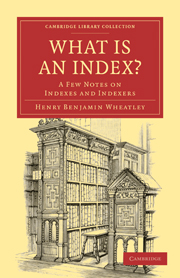HISTORICAL ACCOUNT
Published online by Cambridge University Press: 05 November 2011
Summary
Before proceeding to answer the question that forms the title of this pamphlet, it will be necessary to say somewhat on the history of the word Index. It is now used very generally in English to express a table of references arranged in alphabetical order and placed either at the end or sometimes at the beginning of a book, but this is really one only of its many meanings, and moreover not the earliest one. An index is an indicator or pointer out of the position of required information, such as the finger post on a high road, or the index finger of the human hand. In this general sense the word is used by Drayton :—
“Lest when my lisping, guilty tongue should halt,
My lips might prove the index to my fault.”
Such is still its meaning, and it is in this sense that the Index Society would wish their title to be understood.
There is a group of words, viz. Index, Table, Register, Calendar, Summary, and Syllabus, all of which were once generally used with much the same signification; but as soon as Index had been recognized as a thoroughly English word, it beat its companions in the race, although it had a long struggle with the word Table.
The need of some general indication of the contents of books was early felt, and Seneca, in sending certain volumes to his friend Lucilius, accompanied them with notes of particular passages, so that he, “who only aimed at the useful might be spared the trouble of examining them entire.”
- Type
- Chapter
- Information
- What is an Index?A Few Notes on Indexes and Indexers, pp. 7 - 41Publisher: Cambridge University PressPrint publication year: 2010First published in: 1879



